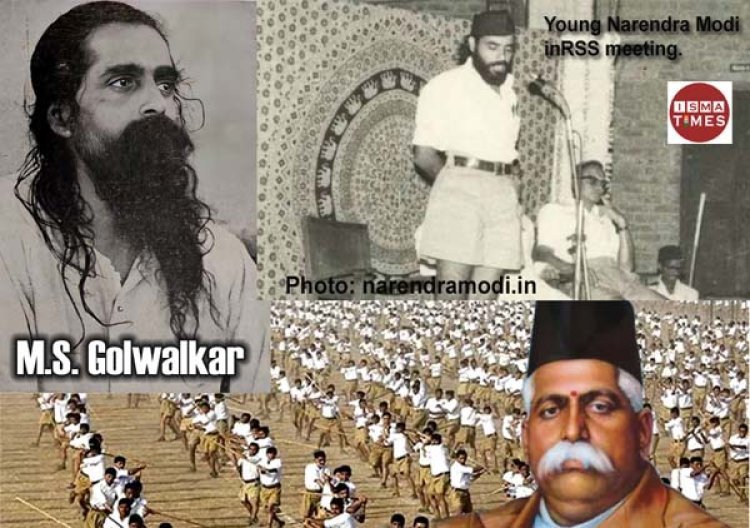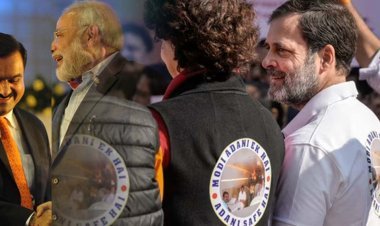RSS: 100 Years and the Dark Shadow of Golwalkar’s Legacy
Through training in shakhas, and ‘dog whistles’ from none other than the former RSS pracharak and the current prime minister himself – ‘Hum do hamare do-wo panch unke pachis,

Ram Puniyani :
India Today, in its annual conclave held in Mumbai on October 4-5, 2023, organised a session on the Rashtriya Swayamsevak Sangh (RSS) titled “RSS 100 years: Why M.S. Golwalkar endures”. The panelists were from mixed streams. Two major themes emerged, one related to Golwalkar’s concept of nation building and attitude towards minorities and the other related to his denigrating the Indian constitution. Not much was spoken about the real impact of his politics on the Indian political scenario as manifested through the plight of minorities today and the criticism of Indian constitution by the ruling dispensation itself.
Golwalkar wrote in his book We or Our Nationhood Defined: “German race pride has now become the topic of the day. To keep up the purity of the Race and its culture, Germany shocked the world by her purging the country of the Semitic Races – the Jews. Race pride at its highest has been manifested here. Germany has also shown how well-nigh impossible it is for Races and cultures, having differences going to the root, to be assimilated into one united whole, a good lesson for us in Hindustan to learn and profit by.” In response to this, Hindutva nationalist panelists pointed out that this has to be seen in the context and cherry picking does not reflect the ideology of the person or the organisation.
To counter this, a panelist quoted his interview with Khushwant Singh, the editor of ‘Illustrated Weekly of India’ in 1972, according to which Golwalkar said that “due to historical factors, Muslims have divided loyalties. But for this Hindus and Muslims both are responsible.” Further one may add that the present sarsanghchalak (chief) of the RSS, Mohan Bhagwat, in his Vigyan Bhavan speeches in 2018, talked in more conciliatory terms and later also went on to say that Hindu and Muslims have the same DNA. He also took on those indulging in lynching, saying, “They are against Hindutva… Though at times, some false cases of lynching have been registered against people…Don’t get trapped in the cycle of fear that Islam is in danger in India…”
What a change in language from the 1939 book to the 1972 interview and now that of the present RSS chief. But what about the deeds resulting from the vast RSS combine, which Golwalkar played a crucial role building in? What is taught in RSS shakhas (local RSS branches), Sarswati Vidyalayas (RSS-run schools), what is propagated through the right-wing IT cell and the social media controlled by this hydra headed organisation? It is pure ‘hate other’ ideology which dominates its teachings. The intent of the organisation does not lie in the mere changing articulation but on the impact on the social fabric, on the hapless Muslim minority.
In a way what Golwalkar said in 1937 is the ground reality today. One after the other, incidents tell the religious minorities that their place in this system is secondary, they can live here only as a marginalised community without asking for citizens rights. When lynchings were going on with gay abandon, Bhagwat and his cabal’s lips were sealed. The clever ‘division of labour’ between different wings of this multi-headed hydra protects the parent organisation from the happenings on the ground. Through training in shakhas, and ‘dog whistles’ from none other than the former RSS pracharak and the current prime minister himself – ‘Hum do hamare do-wo panch unke pachis, (Us two-ours’ two, them five-their 25) ‘they can be recognised by their clothes’, ‘shamshaan-kabristaan’ (Hindu crematorium-Muslim burial place), ‘Rana Pratap devoted his life for protection of cows’ – are just few signals which rule the social thinking leading to hate, violence and polarisation in the society.
It is this which gets approval from the highest echelons of RSS combine when those accused of violence are garlanded by their MP, when the murderers and rapist of Bilkis Bano are released prematurely and feted in the public. Attempts are made to disenfranchise a large section of Muslims through NRC-CAA, where the call for boycott of Muslim traders is a regular phenomenon, where many Muslims are threatened to leave their home and hearth. What else was Golwalkar’s vision in 1939?
As far as the constitution is concerned, RSS’ unofficial mouth piece Organizer, when Golwalkar was RSS chief, wrote, “But in our Constitution, there is no mention of the unique constitutional development in ancient Bharat. Manu’s Laws were written long before Lycurgus of Sparta or Solon of Persia. To this day his laws as enunciated in the Manusmriti excite the admiration of the world and elicit spontaneous obedience and conformity. But to our constitutional pundits that means nothing.”
This is defended by the supporters of nationalism on the ground that there can be differing opinions on the issue. Very true. One realises that in his Vigyan Bhavan lectures Mohan Bhagwat did read the preamble of Indian constitution. But in a true dichotomy between words and deeds and use of forked tongue, the democratic, secular and socialist nature of our constitution is under severe attack from the ideologues of the Hindu nationalist stable. The likes of JNU Vice Chancellor Shatishir Dhulipudi are arguing that “Reducing India to a civic nation bound by a constitution disregards its history, ancient heritage, culture and civilization. I would place India as a civilisation state.”
Another ideologue, J. Sai Deepak, goes on to argue that this constitution is a sign of colonialism, and has roots in Christian ethos. As per him, decolonisation of the mind is essential to detach the Indian constitution in the areas of nature, religion, culture, history, education and language. Importantly, he believes that thinking in the colonial language influences the mind towards coloniality.
And to cap it all, Bibek Debroy, the chief of Economic Advisory Council (EAC) to the prime minister states, “ …this Constitution is a colonial legacy and questions various provisions of the same, particularly the values of socialism, secularism, justice, equality and liberty.” There was a half-hearted attempt to say Debroy was not reflecting the views of the prime minister’s EAC. But the truth is, that this is what Golwalkar wanted and this is what the ideology of the RSS is.
There is no change in its core agenda. The attempt is on to make it look more palatable to all and sundry. While some of the panellists will call him dated, the truth is, that while his articulation may be dated, his agenda is dominating the social scene today.

















